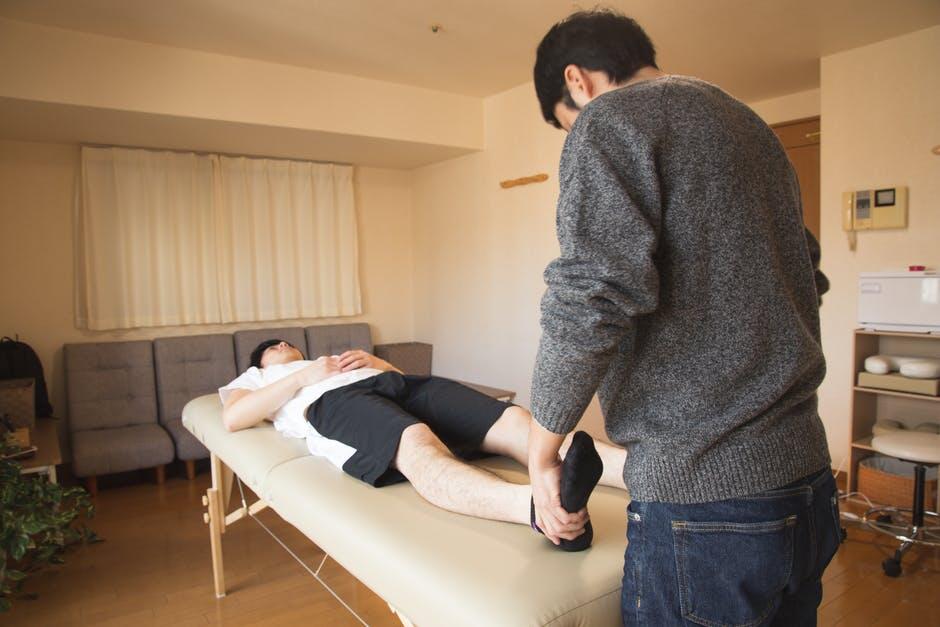More than half of all Americans have received physical therapy at some point in their lives, and almost all report that it is helpful (YouGov). It can be very effective following surgery or injury, as well as for treating chronic pain or mobility issues.
Virtual medicine has become increasingly prevalent over the last 10 or 15 years and accelerated during the COVID-19 pandemic. Unfortunately, physical therapy cannot be done through a computer or phone screen. However, more physical therapists are going to where patients live than ever before.
Below is general information about physical therapy, as well as 17 reasons to consider mobile physical therapy. Keep reading to find out the many benefits it offers and whether it might be the best option for you.
What Is Physical Therapy?
Physical therapy refers to services that help improve the way the body performs physical movements. All states require that it be performed by a licensed healthcare provider, or “physical therapist.”
As mentioned, there are many different circumstances in which people can receive physical therapy. However, there are some common conditions where people seek it. These include:
- Back pain
- Carpal tunnel syndrome
- Lymphedema
- Urinary incontinence
Other situations where someone may seek therapy include following surgeries or after sports injuries. Physical therapy can also be impactful in treating chronic conditions. These include:
- Cerebral palsy
- Chronic obstructive pulmonary disease (COPD)
- Cystic fibrosis
- Multiple sclerosis (MS)
- Muscular dystrophy
- Parkinson’s disease
Finally, physical therapy is distinct from occupational therapy, which often includes treatment that helps overcome challenges that are mental and/or social, along with physical healing. Physical therapy, on the other hand, tends to focus on strengthening or healing one particular physical aspect or area of the body.
What Are the Benefits of Physical Therapy?
Some of the main goals of physical therapy include:
- Managing or eliminating pain
- Reducing or eliminating discomfort
- Combatting stiffness
- Improving movement and range of motion
Physical therapy is also great for building strength and enhancing balance and coordination. It can help improve athletic performance and prevent future injuries. Physical therapy can also improve posture and enhance functional independence.
The goal of some physical therapy regimens may be to help someone walk again following an injury. Another example is the help to reduce pain following surgery.
What Is Mobile Physical Therapy?
Mobile physical therapy refers to a service where a licensed therapist provides sessions in the patient’s home, or at another location of their choosing. This is in place of a traditional clinic or hospital setting, which is more often where these services take place.
17 Reasons to Choose Mobile Physical Therapy
There are many mobile rehab benefits. Here are the main ones to consider.
1. Flexible Scheduling
One of the biggest reasons to choose mobile physical therapy is greater flexibility in scheduling. Mobile therapists often have more leeway in planning appointments. They also may be more able to shift appointments around at the last minute.
Flexibility in scheduling can make it easier for patients. They may be able to squeeze in or reschedule appointments even during busy weeks.
2. Increased Convenience
Perhaps the biggest reason to go with a mobile physical therapy service is convenience. Physical therapists coming to your home eliminates the need to travel to remote offices–or travel anywhere for that matter. You can receive convenient physical therapy in the comfort of your own home without having to do anything more.
3. Safe Physical Environment
Another advantage of mobile physical therapy services is that they provide a safe space for undergoing treatment. A trained physical therapist will be able to suggest arrangements for furniture based on the natural space available in your home. In many instances, they can recreate the safeguards of a dedicated clinic.
4. Safer Healthcare Environment
Not having to travel to a clinic or sit in a crowded waiting room is another benefit to mobile therapy. It lets you avoid exposure to illnesses or infections. This can be especially useful for someone with a weakened immune system, an increased risk associated with particular diseases, or anyone who wants to avoid getting sick during flu season.
5. Time Savings
Another benefit is that having mobile physical therapy done in your home can save a great deal of time. There is no fighting traffic or rearranging schedules to arrive at a particular clinic.
Therapists can meet you in your home or at almost any place that is suitable for treatment. It does not even have to be in the same location every time.
6. Faster Access to Care
A related benefit of mobile physical therapy is that it can help patients gain access to care faster. Rather than waiting for days or even weeks for an opening at a traditional clinic, mobile services may be able to schedule you much faster.
There can be many health advantages to starting treatment as soon as possible. This can be especially helpful for athletes who wish to resume sports, or for someone who is injured and wants to return to work, as soon as possible.
7. Personalized Care
Mobile physical therapy services have the potential to offer an elevated level of personalized care to patients. One reason for this is that they can view and evaluate your personal living space and address unique challenges you might face. If, for instance, you have mobility needs, they may be able to recommend changes to the environment to help accommodate those.
8. Incorporation of Everyday Items
An unexpected advantage of mobile physical therapy services is that patients learn to use everyday items to their advantage. Physical therapy often relies on specialized machines and exercise equipment (see below). However, many of these may not be available in a home setting.
An experienced mobile physical therapist knows this and will be prepared from the outset. They will be able to recommend suitable alternatives that will help patients achieve the same goals. For instance, they may lean more on movements on a couch to increase range of motion, rather than exercises that rely on certain equipment.
9. Functional Applications
In addition to providing specific routines and exercises for treatment or recovery, physical therapy at home can combine this with tasks of daily living. For instance, a physical therapist might incorporate walking to the mailbox or bending over to pick up items. It allows the patient to work on recovery while getting used to the physical challenges that they face in their everyday lives.
10. Added Opportunity for Education
Another advantage of mobile physical therapy services is that they offer more of an opportunity for education and learning. It gives therapists a chance to demonstrate real-world applications to the exercises performed.
Therapists can give ergonomic advice regarding home workplace setup or furniture where patients spend a lot of time. They can give practical advice that increases safety without diminishing the impacts of the therapy.
11. Increased Privacy
Another benefit of mobile physical therapy services is that they offer a greater level of privacy. It can be more comfortable and less intimidating than receiving services at a clinic. Also, it lets you avoid entering crowded waiting rooms with people from your community.
12. Customized Home Programs
Another benefit of mobile physical therapy services is that it gives therapists first-hand experience with the environment. It lets them put together a customized exercise regimen based on the setting. This can translate to exercises that are more effective and better assurance that you will carry them out appropriately between sessions.
13. Ideal for Any Situation
It is not uncommon for people who need physical therapy to have mobility issues. It may be difficult to walk, stand, or sit in a car. It could be uncomfortable or even dangerous to drive.
Home physical therapy solves such problems. It is a suitable option for almost anyone. That includes people whose health makes it difficult or impossible to receive care outside of their homes.
14. Motivation and Support
Another natural advantage that going with mobile physical therapy can bring is ongoing motivation and support. In-home therapy services make for more personalized sessions and supervision. This, along with some of the other advantages, such as convenience and time-savings, will make patients more likely to stay on track with rehabilitation.
15. Family or Caregiver Involvement
Another big plus of mobile physical therapy services is that it is easier for family members to be involved in the treatment process. Having loved ones or assistants close by during sessions allows them to learn specific exercises and routines with which they can assist.
16. Better Continuity of Care
An advantage of mobile physical therapy related to flexible therapy solutions and the removal of any hassles is that it can translate to better continuity of care. All the factors that eliminate cancellations mean you are more likely to consistently receive the treatment you need. This can translate to faster recovery and improved health outcomes in general.
17. Cost-Effectiveness
You might assume that mobile physical therapy services cost a premium. In fact, in many cases, they may be cheaper than regular clinic arrangements.
There are savings on transportation costs and those associated with your time. There are other ways that mobile physical therapy can be cheaper than those offered a brick-and-mortar clinics.
One is that mobile physical therapists do not have as much overhead. They are not paying to rent office space or maintain buildings and grounds, or for on-site staff. In many cases, they can pass these savings along to their clients.
Also, most insurance plans and even Medicare may cover mobile physical therapy programs. So, there may be little or no financial difference in pricing.
Are There Any Downsides to Mobile Physical Therapy Services?
There are a few potential limitations to pursuing mobile physical therapy services. These include:
- Space limitations
- Restrictions on available equipment options
- Distractions
Keep in mind that these are not inevitable with any given arrangement. For instance, some homes may have adequate space to perform therapies, while others do not.
Depending on the type of therapy you are receiving, these may not be deal-breakers either, although they are important to think about. Also, keep in mind that an experienced home physical therapist will be able to identify any potential issues and recommend solutions.
Space Limitations
Effective physical therapy often requires enough room to perform various exercises and maneuvers. If you live in a very small home or apartment, or one that is full of furniture and belongings, it could impact the treatment.
How much space you need depends on the nature of the treatment. A qualified physical therapist should be able to give you an estimate of space requirements before starting service though.
Restrictions on Equipment Options
Physical therapists rely on a range of equipment to provide impactful therapy. Some of these items are portable. For instance, a therapist should have no trouble traveling with foam rollers, resistance bands, dumbbells, medicine balls, and treatment tables.
Machines like treadmills and exercise bikes are not as easily moved from place to place. Other pieces of equipment, like parallel bars or pulley systems, are stationary and can only be used in dedicated treatment spaces.
As mentioned, you may not require some of these less portable machines or equipment. Also, the therapist may be able to recommend alternatives, such as walking outdoors instead of using a treadmill.
Distractions
A final potential limitation of home physical therapy is that there could be distractions. Family members, roommates, pets, and even looming household chores and responsibilities could potentially interrupt or sidetrack therapy sessions.
However, a good therapist will be prepared for these challenges. They should also be able to advise you on how best to prepare for each visit so that you can get the most out of the therapy session.
Schedule Mobile Physical Therapy Services Today
Mobile physical therapy can be a convenient, safe, and affordable alternative to traveling to a clinic. Consider the many advantages described above to determine if it is the right option for you or your loved one.
Quick Care Connect is revolutionizing staffing and healthcare management by providing a faster way to find and schedule services. We guarantee background and credentials screenings for all professionals in our portal and advanced security measures to ensure the protection of your personal information. Reach out to us today to learn more about physical therapy on demand.


